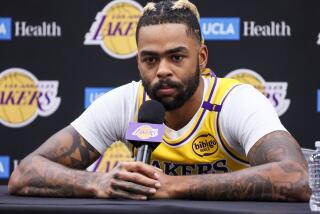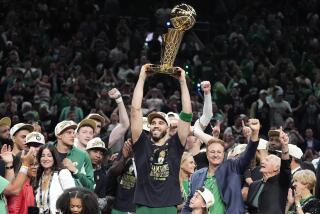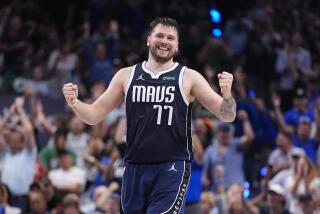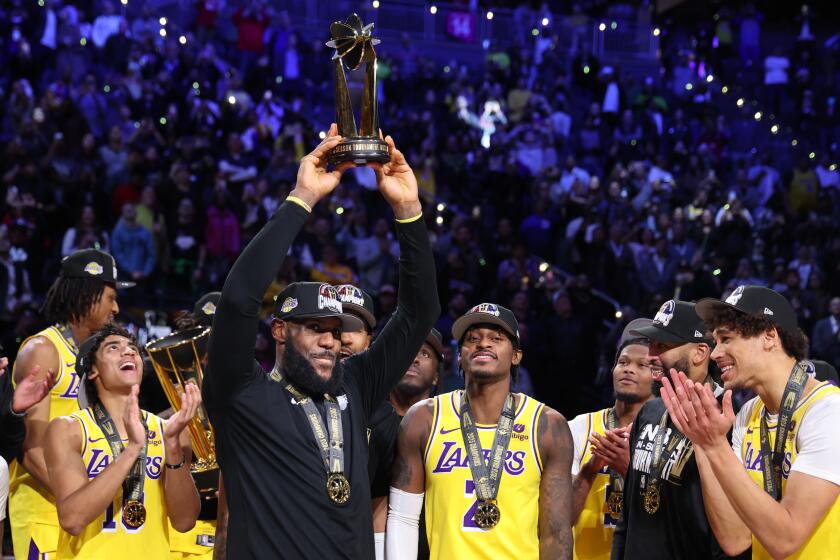Deflating the Lakers : With Balloons Perched Atop the Forum in Anticipation of a Title, Celtics Pulled Off an Improbable Victory With an Improbable Shot
BOSTON — The subject was the 1968-69 Boston Celtics, so naturally Red Auerbach lit a victory cigar. He took two puffs and let the smoke billow over the office, just like those balloons that stayed atop the Forum when the Celtics beat the Lakers in a seventh game that season.
Even now, when Auerbach is asked to reflect on the Celtic championship team of 1968-69, he smiles contentedly. Of the 15 National Basketball Assn. titles Boston has won over the years, that one is clearly the favorite to the Celtics’ president.
“I’ll always remember those balloons and that shot, too,” Auerbach said. “That made it more special than all the other titles we won.”
There is a certain lore surrounding the 1968-69 Celtics. It is more than just the Lakers’ victory balloons that were deflated or Don Nelson’s lucky shot in Game 7. When the Celtics successfully defended their title that season, it would prove to be the last time an NBA championship team has been able to repeat.
Many excellent teams have tried and failed in the last 16 years. Reasons vary. As history has shown, the end of the Celtics’ dynasty was the beginning of an era of parity in the NBA. Even the subsequent Celtic championship teams (1973-74, 1975-76, 1980-81, 1983-84) haven’t been able to equal the success of previous Celtic teams.
“Everybody talks about the difficulty of winning back-to-back now,” said John Havlicek, a member of the 1968-69 championship team, among others. “But back then, we didn’t give it a thought because we had won a lot of titles in a row before that.”
Winning, of course, came easily for the Celtics in those days. They had Bill Russell and many talented role players found and developed under Auerbach’s shrewd system. But by the 1968-69 season, the Celtic dynasty showed definite signs of crumbling.
The Celtics seemed as old as ancient Boston Garden. Russell, the player-coach that season, was 35, Sam Jones 36, Bailey Howell 32, Tom (Satch) Sanders 30, and Emmette Bryant 30. Havlicek, Nelson and Larry Siegfried were all in their late 20s. Jones had announced he would retire after the season and Russell privately told Auerbach that he, too, would retire--win or lose.
Perhaps another reason why that championship is special to Auerbach is because not many outside New England thought the Celtics could win. After all, the Lakers had acquired Wilt Chamberlain from Philadelphia to join Jerry West and Elgin Baylor and both the New York Knicks and Baltimore Bullets had young, strong and talented players.
When the Celtics finished the regular season in fourth place with a 48-34 record, it was the club’s worst finish since 1949-50. Yet, there was a feeling among those Celtics that they could band together one last time to put one last banner on the Garden rafters during the Russell era.
“We had been together so long we knew we could still do it,” Sanders said. “That wasn’t our best team but certainly one of the hardest working.”
There seemed to be a special bond among the players on that Celtic team. Because they had been together so long, it could almost be described as a team that coached itself. The ‘68-69 Celtics, Team Co-Op.
Auerbach had given up coaching two years before, citing too heavy a workload as general manager. So, in an effort to keep Russell happy and interested, Auerbach made his star center player-coach in 1966-67. The Celtics lost the title to Chamberlain and Philadelphia that season, but recaptured it in 1967-68.
“I did it to keep his interest going,” Auerbach said. “It was beginning to fade by that time. It seemed to me that the best way to motivate Bill Russell at that point was to put him in charge.”
Asked to rate Russell as a coach, Auerbach said: “Fair.”
“But, it was because he just got bored,” Auerbach quickly added. “Bill could’ve been a great coach, but he didn’t like the nitty-gritty of it. He had too many distractions, but if he wanted to, he would’ve been a great coach.”
Because the Celtics were a veteran team that had played together many years, all the veterans had input in the decision making. In some respects, it had to be that way because Russell obviously couldn’t be a bench coach when he was on the court.
“It was an unusual situation,” said Clipper Coach Don Chaney, a rookie on the ‘68-69 team. “The strange thing about it was that everyone knew what to do, almost automatically. I do remember Bill running up court during a fastbreak and pointing to the bench for guys to come into the game. He missed a lot, but there were also a lot of things he saw on the court that a bench coach wouldn’t.
“The other guys wouldn’t be afraid to tell Bill he wasn’t playing well. Sometimes, some of the guys would say, ‘Hey, Russ. You’re not doing it.’ ”
Timeouts were mostly group discussions, Russell serving as moderator. It wasn’t unusual for Sam Jones, a year older than Russell, to call plays or for Russell to ask Havlicek or Siegfried to make suggestions. It wasn’t anarchy, but it wasn’t a dictatorship, either.
“When you have a veteran club, the players know what it takes to get it down,” Siegfried said. “It brought us closer together as a team. Everybody felt like they were responsible for what happened out there. Guys would make suggestions at halftime and it was always well received.
“Russ wouldn’t always use what we said, but he’d always listen to it. He’d come in and say, ‘OK, men, got any suggestions.’ He came up with most of the ideas. I thought he was a good coach.”
Russell may have been the coach, but Auerbach still was the leader. Although he didn’t travel to all the road games, Auerbach was a regular at Garden practices. Russell rarely practiced with the team and huddled with Auerbach on the sidelines.
“Oh yes, Red was involved,” Chaney said, laughing. “He’d be at every practice that season. I remember that later, as he got older, he’d sleep at practice all the time.”
Auerbach, of course, built the team through deft handling of personnel and wise trades. It was a team that revolved around Russell, who dominated defensively and was the focal point of the offense.
The predominant quality of the ‘68-69 Celtics, as with all old Celtic teams, was defense.
“We had Russell, and that was what we really needed,” Siegfried said. “That year, we were more defensive than previous years. Defense is a willingness to dig it out and work hard and we were able to win that way.”
Added Chaney: “We had a good system going. There was great balance and chemistry. Individually, we were limited in talent. Everybody had a role. There were guys for defense, guys for rebounding and scoring. It was one smooth machine.”
The machine sputtered and stalled during the regular season. The NBA had expanded to 14 teams and the months of travel and the strong Eastern Conference opponents took its toll on the Celtics. Also, it was difficult for such a veteran team to stay motivated.
Russell declined to be interviewed for this story, but in a Sports Illustrated article in the summer of ’69 he detailed the rigors of life in the NBA.
“If you’re really looking for a reason why I feel I’ve played enough, I’ll tell you this,” he wrote. “There are professionals and there are mercenaries in sports. The difference between them is that the professional is involved. I was never a mercenary. If I continued to play, I’d become a mercenary because I’m not involved anymore.
“I played because I was dedicated to being the best. I was part of a team, and I dedicated myself to making that team the best. To me, one of the most beautiful things to see is a group of men coordinating their efforts towards a common goal--alternately subordinating and asserting themselves to achieve real teamwork in action. I tried to do that--we all tried to do that--on the Celtics. I think we succeeded.”
Never was the Celtics’ teamwork more evident than during the 1969 playoffs.
“The pressure of losing was great,” Havlicek said. “We thrived on that.”
The Celtics beat Philadelphia in the first round and defeated New York in six games to set up another playoff final against the Lakers. In everyone’s mind, except the Celtics, the Lakers were clear favorites. They even had the home-court advantage for the first time ever against the Celtics.
But even after the Lakers won the first two games at the Forum, the Celtics were still confident heading back to Boston for the next two games.
“The Lakers had more talent,’ Siegfried said. “But we had Russell and we had pride and professionalism.”
Whatever it was, the Celtics won both games at the Garden. Game 4 was a classic, the Celtics winning on a last-second jump shot by Sam Jones. During the timeout before the game-winning attempt, Russell had taken himself out of the game, but he didn’t devise the winning play.
“Larry Siegfried and I had used a play at Ohio State that was good for last-second shots,” Havlicek said. “So, we told Russ. We had Sam come off a triple pick and he got the open shot.”
The Celtics were blown out in Game 5 at the Forum and returned to the Garden to face elimination. After Game 5, Russell gathered the Celtics in the locker room for a rare speech.
“Russ made a commitment then,” Siegfried said. “He told us he had let the team down and that he was going to make a commitment to win the next two games. It wasn’t real rah-rah but it was very charismatic. There are few people able to move you like that.”
Added Sanders: “We figured if Russell could make a commitment like that and get that motivated, we should, too.”
Boston won Game 6 at the Garden and returned to Los Angeles for a seventh game. The Celtics didn’t need any inspiration, but they got it from Laker owner Jack Kent Cooke, who had planned quite a victory celebration. There were the balloons, the USC marching band with sheet music for “Happy Days Are Here Again” and champagne on ice.
“Somehow, we got a hold of a script for the Lakers’ celebration,” Havlicek said. “They had it all planned. We hung it in our locker room.”
The Celtics seemed on their way to an easy victory, but a late Laker comeback made it close. With Boston leading, 103-102, and 1:17 to play, Nelson attempted a jump shot that hit the back of the rim and bounced four feet in the air. All it touched on the way down was net. That gave the Celtics a three-point lead and the Lakers never recovered, losing 108-106.
The Celtics had won the championship in Russell’s final season--although he still hadn’t made it official. But as he walked out of the locker room after the game, Russell was stopped by trainer Joe DeLauri.
DeLauri asked, “Where are you heading, Russ?”
Russell answered: “Joe, I’ve just played my last game.”
Three months later, Russell made it official. The Celtics dynasty walked out the door with him. It would take Auerbach five years before he could build another championship team, but that 1973-74 Celtic team didn’t repeat and neither has any other team.
Talking to players from the 1968-69 Celtics, you get the impression that it’s impossible to have repeat champions. Or, at least, impossible for any team to build a dynasty such as the Celtics.
The reasons range from parity through expansion, to lack of incentive because of big contracts, to simple luck.
“There’s more parity,” Auerbach said. “Teams are stronger benchwise. See, years ago, you could repeat if your key players didn’t get hurt. Today, if your key guys get hurt, you’ve got great backups.”
Satch Sanders cites high salaries and free agency. “Personnel changes a lot quicker now. Players come and go. With the Celtics, we’d develop a guy for three years, then slowly put him in the lineup. You really can’t do that anymore.”
Siegfried needed only two words to explain why there hasn’t been a dominant franchise:
“Bill Russell.”
Auerbach laughed and took another puff on his cigar when Russell’s name was mentioned.
“When he told me he was going to retire, I didn’t believe him. Maybe I just didn’t want to believe it.”
More to Read
All things Lakers, all the time.
Get all the Lakers news you need in Dan Woike's weekly newsletter.
You may occasionally receive promotional content from the Los Angeles Times.






